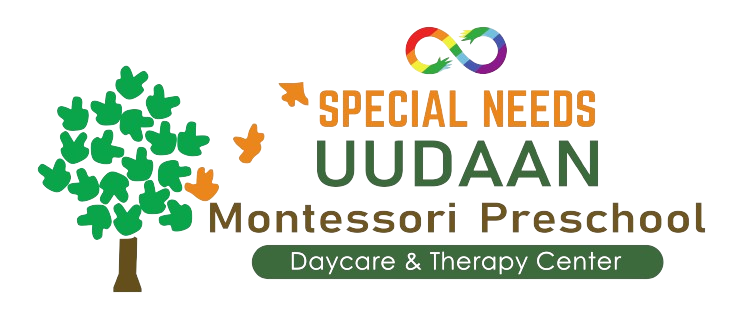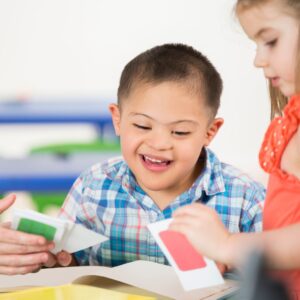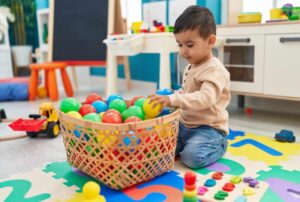
How Montessori Education Supports Children with Special Needs
At Special Needs Uudaan, we believe every child has the potential to learn and grow in their unique way. Montessori education has long been celebrated for its inclusive, individualized approach to learning, making it a particularly effective method for supporting children with special needs. In this blog, we will explore how Montessori education can benefit children with learning differences, including autism, ADHD, and other developmental challenges, by providing a nurturing, adaptable, and child-centered environment.
What Is Montessori Education?
Montessori education, developed by Dr. Maria Montessori, is a child-centered approach that emphasizes independence, self-paced learning, and hands-on experiences. It fosters a deep love for learning by allowing children to explore their interests and abilities at their own pace. In Montessori classrooms, children are encouraged to choose their activities, work collaboratively with peers, and engage with carefully designed materials that promote cognitive, emotional, and social development.
This method can be highly beneficial for children with special needs because it is flexible and can be tailored to meet each child’s specific developmental stage and abilities.

How Does Montessori Education Benefit Children with Special Needs?
Individualized Learning Plans
Montessori education focuses on the individual learner rather than a one-size-fits-all curriculum. Children with special needs often require personalized attention and adaptations to learning materials, and the Montessori approach naturally accommodates this need. Teachers observe each child closely, tailoring activities and lessons to suit their learning style, interests, and pace. This allows children with special needs to feel confident and supported in their educational journey.
For instance, a child with autism may benefit from specific sensory activities that help them engage with the environment, while a child with ADHD may thrive in a setting that allows for movement and hands-on learning.
Emphasis on Sensory Learning
Many children with special needs respond particularly well to sensory-based learning. Montessori classrooms are rich in sensory materials that stimulate learning through touch, sound, sight, and movement. This is beneficial for children with sensory processing disorders or those on the autism spectrum, as it helps them better engage with their surroundings in a way that feels comfortable to them.
For example, Montessori materials such as sandpaper letters, bead chains, and puzzles provide tactile learning opportunities that enhance motor skills and cognitive development.
Focus on Independence and Self-Regulation
Montessori education places a strong emphasis on independence, encouraging children to take ownership of their learning. For children with special needs, this can be incredibly empowering. Activities are designed to be self-correcting, which fosters a sense of accomplishment and reduces frustration. Children can work at their own pace, without pressure, and build on their skills incrementally.
This independence also extends to self-regulation. Children with ADHD, for example, often struggle with impulse control and focus. In a Montessori classroom, they are given the freedom to move between tasks, take breaks when needed, and work in a way that suits their attention span.
Nurturing Emotional and Social Skills
One of the core principles of Montessori education is fostering emotional and social development. In a Montessori environment, children are encouraged to collaborate, communicate, and resolve conflicts with their peers. For children with special needs, this focus on social interaction can be invaluable.
In mixed-age classrooms, older children often help younger ones, creating a sense of community and responsibility. Children with developmental delays or social challenges can practice social skills in a supportive, non-judgmental setting. They learn to express their needs, share, and take turns, which can enhance their emotional intelligence.
Freedom to Explore Interests
Montessori education allows children to pursue their interests, which can be especially beneficial for children with special needs who may have strong, specific preferences. This freedom to explore what they enjoy can boost their engagement and motivation, making learning a more positive experience.
Children with autism, for instance, may have specific interests that they focus on intensely. In a Montessori classroom, these interests can be integrated into their learning activities, making education more enjoyable and relevant to their lives.

Why Choose Montessori Education for Children with Special Needs?
The Montessori philosophy aligns with the core values of inclusivity and respect for the individual. It creates a learning environment that adapts to the child, rather than forcing the child to adapt to the environment. This is especially crucial for children with special needs, as it allows them to learn in a way that feels natural and supportive to their developmental stage and abilities.
Some additional reasons to choose Montessori education for children with special needs include:
- Small class sizes: Montessori classrooms often have a low student-to-teacher ratio, allowing for more personalized attention.
- Respect for the child: Montessori teachers are trained to respect each child’s unique path of development, creating a nurturing atmosphere of acceptance and patience.
- Adaptable curriculum: The Montessori curriculum is flexible and can be adjusted to meet the needs of children with various learning challenges.
How Special Needs Uudaan Implements Montessori Principles
At Special Needs Uudaan, we are committed to providing an inclusive Montessori education for children with special needs. Our classrooms are designed to meet the sensory, cognitive, and social-emotional needs of every child, ensuring they receive the support they need to thrive. Our teachers work closely with families to develop individualized learning plans that promote growth and success in a safe and nurturing environment.
We offer a wide range of Montessori-based activities tailored to support children with diverse learning needs, from sensory exercises and fine motor skills development to collaborative group work and self-directed learning. We believe that every child deserves the opportunity to reach their full potential, and our Montessori approach helps them do just that.
Conclusion
Montessori education provides a powerful framework for supporting children with special needs by emphasizing individualized learning, sensory engagement, and social-emotional development. At Special Needs Uudaan, we integrate these principles into everything we do, offering a compassionate, child-centered environment where every child can flourish. If you’re seeking a supportive, inclusive educational experience for your child, contact us today to learn more about our Montessori-based programs for children with special needs.